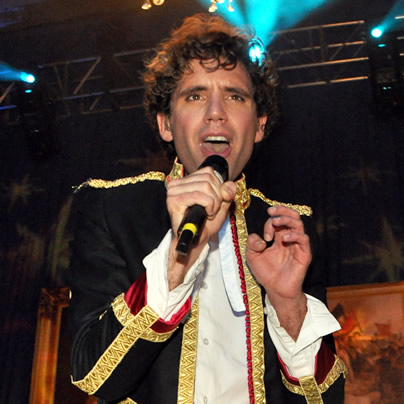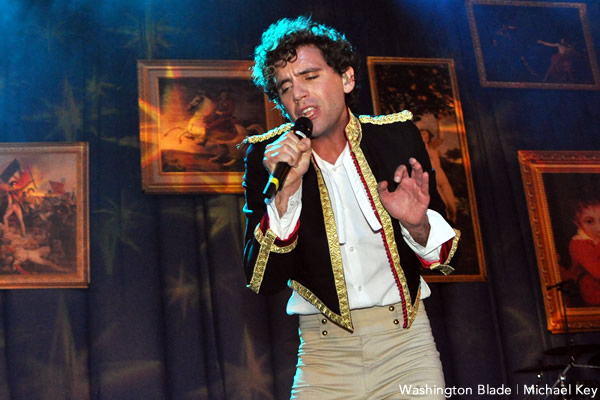Arts & Entertainment
Stripped-down Mika
Out singer brings three-man combo for D.C. tour stop


Mika returns to Washington next week. His show at the Historic Sixth & I Synagogue is sold out. (Washington Blade file photo by Michael Key)
Mika
Wednesday, 8 p.m.
Sixth & I Synagogue
600 I St., N.W.
SOLD OUT
Sixthandi.org
Bit.ly/mikaofficial
Gay pop singer Mika was in Vancouver when we spoke by phone two weeks ago. He was in tour rehearsals for a stripped-down 17-date mini tour behind his latest album “The Origin of Love,” which dropped in October.
There’s good news and bad — he is coming to Washington but the show is sold out. He’s slated to be here Wednesday night for a show at the Historic Sixth & I Synagogue. A review of his March 27 show at Los Angeles’s El Rey Theatre drew raves. A blogger (Neon Tommy) said he spent much of the evening at the piano and, “as great as his voice may sound in recordings, it is unbelievably smooth live” and “beyond impressive.”
WASHINGTON BLADE: What kind of instrumentation will you bring?
MIKA: There are three of us playing everything from piano to clarinet to sax to accordion to marimba to vibraphone — we have all these different instruments being played and we’re trying almost to make it sound classically influenced almost. We’ve done some scoring on a lot of this stuff just for this tour.
BLADE: How do you take highly produced dance pop and make it work with that kind of instrumentation?
MIKA: You take it back to the way it was written, to its most essential things. Things start out very basically, like maybe just piano and bass, and then build and build until you get the more dance stuff. But there’s loads of different ways to do it. It almost sounds more tribal on stage. It’s kind of like you’re getting people up and dancing and singing without all the bleeps and blowups.
BLADE: Is this where you are musically now or is it just a way to contrast it with the touring you did last fall?
MIKA: It definitely will affect the sound of my next record. We’re testing new songs and it’s already happening. The new stuff is a lot more sparse.
BLADE: The transition in your vocals from your natural range into falsetto is so seamless. With many singers it’s so much more pronounced. Was that just always the way it was or have you worked to develop and refine that?
MIKA: It’s really the result of growing up being trained by Russian classical musicians. It was like really serious professional singing. I can flip really effortlessly because I’ve been doing it since I was about 11. At the same time, my full voice range is actually quite limited. I’m technically a baritone, so pop just doesn’t work for that kind of voice and I had to develop a way to have more range. If you listen to Freddie Mercury or Prince, you see how we try to stretch it as far as you can and make it so it’s almost unnoticeable.
BLADE: Now that you’ve been out a while, what differences have you noticed career-wise?
MIKA: There’s been no change whatsoever in the people coming to the shows. It’s exactly the same demographics … I have always had this very crazy mix. Press wise, people talk about it, but it’s only one question that comes and goes because I’ve never lied or pretended to be anything I wasn’t. I refused to label myself. And the music hasn’t changed. Beyond that, I think there’s definitely a different sort of person now who comes up and talks to me on the street. That happens in a very different way. I think it’s made me slightly more approachable to some people.
BLADE: Are you in a relationship now?
MIKA: Yes I am but it’s hard. Beyond the traveling, this desire to constantly be creating … I think takes its toll on a relationship. … Relationships are about stability and that isn’t necessarily the most conducive thing to the creative process.
BLADE: You have such great hair — any tips?
MIKA: Wow, relationships to hair — that’s quite a change.
BLADE: Well, I’m trying to move fast.
MIKA: The hair thing, I don’t know. I hate washing it. I feel like you lose a bit of your brain or something every time you wash it.
BLADE: How often do you wash it?
MIKA: Maybe like once a week or something. It’s kind of skanky.
BLADE: How easily do the hooks come? Is there a large discard pile of songs that just aren’t hooky enough or can you make the hooks tighter as you write and tweak?
MIKA? With the last record I think I wrote 16 or 17 songs and I put out 15 so no, there’s not a lot of waste. It’s a very efficient writing process. I try to write like a child, to write as someone who’s allowing himself to be a child. I don’t really chase hooks, but I try to capture that feeling of being an 8- or 9-year-old girl or boy on a holiday. … I’m obsessed with the craft of thrill building.

Team DC, the umbrella organization for LGBTQ-friendly sports teams and leagues in the D.C. area, held its annual Night of Champions Awards Gala on Saturday, April 20 at the Hilton National Mall. The organization gave out scholarships to area LGBTQ student athletes as well as awards to the Different Drummers, Kelly Laczko of Duplex Diner, Stacy Smith of the Edmund Burke School, Bryan Frank of Triout, JC Adams of DCG Basketball and the DC Gay Flag Football League.
(Washington Blade photos by Michael Key)




















The 2024 National Cannabis Festival was held at the Fields at RFK Stadium on April 19-20.
(Washington Blade photos by Michael Key)
















Covering the @NatlCannaFest at RFK Stadium for @WashBlade . Stop by the LGBTQ+ booth and pick up a paper if you are here. pic.twitter.com/is7hnsaPns
— Michael Patrick Key (@MichaelKeyWB) April 20, 2024
Theater
‘Amm(i)gone’ explores family, queerness, and faith
A ‘fully autobiographical’ work from out artist Adil Mansoor

‘Amm(i)gone’
Thorough May 12
Woolly Mammoth Theatre
641 D St., N.W.
$60-$70
Woollymammoth.net
“Fully and utterly autobiographical.” That’s how Adil Mansoor describes “Amm(i)gone,” his one-man work currently playing at Woolly Mammoth Theatre.
Both created and performed by out artist Mansoor, it’s his story about inviting his Pakistani mother to translate Sophocles’s Greek tragedy “Antigone” into Urdu. Throughout the journey, there’s an exploration of family, queerness, and faith,as well as references to teachings from the Quran, and audio conversations with his Muslim mother.
Mansoor, 38, grew up in the suburbs of Chicago and is now based in Pittsburgh where he’s a busy theater maker. He’s also the founding member of Pittsburgh’s Hatch Arts Collective and the former artistic director of Dreams of Hope, an LGBTQ youth arts organization.
WASHINGTON BLADE: What spurred you to create “Amm(i)gone”?
ADIL MANSOOR: I was reading a translation of “Antigone” a few years back and found myself emotionally overwhelmed. A Theban princess buries her brother knowing it will cost her, her own life. It’s about a person for whom all aspirations are in the afterlife. And what does that do to the living when all of your hopes and dreams have to be reserved for the afterlife?
I found grant funding to pay my mom to do the translation. I wanted to engage in learning. I wanted to share theater but especially this ancient tragedy. My mother appreciated the characters were struggling between loving one another and their beliefs.
BLADE: Are you more director than actor?
MANSOOR: I’m primarily a director with an MFA in directing from Carnegie Mellon. I wrote, directed, and performed in this show, and had been working on it for four years. I’ve done different versions including Zoom. Woolly’s is a new production with the same team who’ve been involved since the beginning.
I love solo performance. I’ve produced and now teach solo performance and believe in its power. And I definitely lean toward “performance” and I haven’t “acted” since I was in college. I feel good on stage. I was a tour guide and do a lot of public speaking. I enjoy the attention.
BLADE: Describe your mom.
MANSOOR: My mom is a wonderfully devout Muslim, single mother, social worker who discovered my queerness on Google. And she prays for me.
She and I are similar, the way we look at things, the way we laugh. But different too. And those are among the questions I ask in this show. Our relationship is both beautiful and complicated.
BLADE: So, you weren’t exactly hiding your sexuality?
MANSOOR: In my mid-20s, I took time to talk with friends about our being queer with relation to our careers. My sexuality is essential to the work. As the artistic director at Dreams of Hope, part of the work was to model what it means to be public. If I’m in a room with queer and trans teenagers, part of what I’m doing is modeling queer adulthood. The way they see me in the world is part of what I’m putting out there. And I want that to be expansive and full.
So much of my work involves fundraising and being a face in schools. Being out is about making safe space for queer young folks.
BLADE: Have you encountered much Islamophobia?
MANSOOR: When 9/11 happened, I was a sophomore in high school, so yes. I faced a lot then and now. I’ve been egged on the street in the last four months. I see it in the classroom. It shows up in all sorts of ways.
BLADE: What prompted you to lead your creative life in Pittsburgh?
MANSOOR: I’ve been here for 14 years. I breathe with ease in Pittsburgh. The hills and the valleys and the rust of the city do something to me. It’s beautiful, it’ affordable, and there is support for local artists. There’s a lot of opportunity.
Still, the plan was to move to New York in September of 2020 but that was cancelled. Then the pandemic showed me that I could live in Pittsburgh and still have a nationally viable career.
BLADE: What are you trying to achieve with “Amm(i)gone”?
MANSOOR: What I’m sharing in the show is so very specific but I hear people from other backgrounds say I totally see my mom in that. My partner is Catholic and we share so much in relation to this.
I hope the work is embracing the fullness of queerness and how means so many things. And I hope the show makes audiences want to call their parents or squeeze their partners.
-

 District of Columbia5 days ago
District of Columbia5 days agoNew D.C. LGBTQ+ bar Crush set to open April 19
-

 District of Columbia5 days ago
District of Columbia5 days agoReenactment of first gay rights picket at White House draws interest of tourists
-

 South America3 days ago
South America3 days agoDaniel Zamudio murderer’s parole request denied
-

 Opinions5 days ago
Opinions5 days agoOpen or closed? No, not your bar tab









